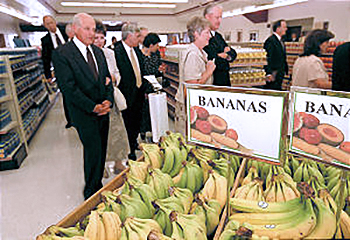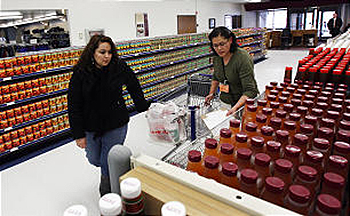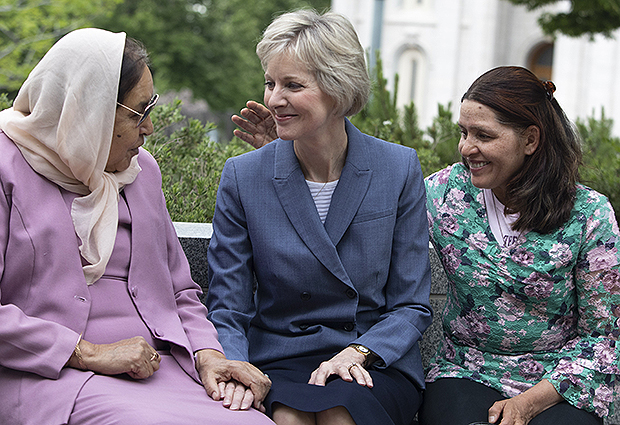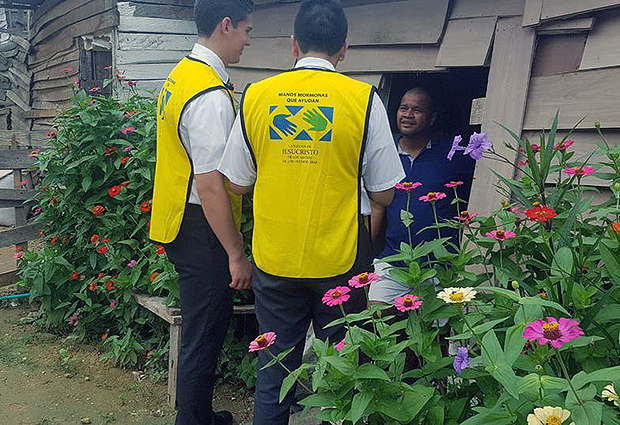Church’s $2 Billion of Humanitarian Aid Stems from Loving God and Others
Contributed By Aubrey Eyre, Church News staff writer

President Russell M. Nelson of The Church of Jesus Christ of Latter-day Saints and his wife, Sister Wendy Nelson, stand with wheelchair recipients after Latter-day Saint Charities donated the wheelchairs in Buenos Aires, Argentina, on Wednesday, August 28, 2019. Photo by Jeffrey D. Allred, Deseret News.
Article Highlights
- Humanitarian efforts stem from Latter-day Saints’ seeking to love God and their neighbor.
- Latter-day Saint Charities has provided more than $2 billion in assistance worldwide.
“Latter-day Saints, as with other followers of Jesus Christ, are always looking for ways to help, to lift, and to love others.” —President Russell M. Nelson
Related Links
The reputation of Latter-day Saints as being a people who, through service and love for their fellowmen, build strong families and improve their communities precedes them around the world.
“Since becoming President of the Church, I have been amazed at how many presidents, prime ministers, and ambassadors have sincerely thanked me for our humanitarian aid to their people,” said President Russell M. Nelson during his address at the close of the Sunday morning session of the 189th Semiannual General Conference.
Everywhere President Nelson goes, leaders express gratitude for the strength that faithful members of the Church bring to their countries “as loyal, contributing citizens,” he said.
Such a reputation, President Nelson said, comes from Latter-day Saints’ desire to be true disciples of Jesus Christ and to follow the two great commandments of God: to love God and to love one’s neighbor.
Everywhere Saints live, they make conscientious efforts to care for others as much as or more than they care for themselves.
“Regardless of where we call home, members of the Church feel passionately about the fatherhood of God and the brotherhood of man. Thus, our greatest joy comes as we help our brothers and sisters, no matter where we live in this wonderful world,” President Nelson said. “Latter-day Saints, as with other followers of Jesus Christ, are always looking for ways to help, to lift, and to love others.”
Helping others is the path of discipleship, said Elder Dieter F. Uchtdorf of the Quorum of the Twelve Apostles, who also spoke during the Sunday morning session.
Speaking of the same two commandments, Elder Uchtdorf noted that “faith, hope, love, compassion, and service refine us as disciples.”
It is through one’s efforts to help others—the poor and needy and those in distress—that one’s character can be purified and their spirit enlarged in a way that brings them closer to Christ, he said. But such efforts should be done without an expectation for reward or recognition and without any ill intent.
“When you fill your hearts with the pure love of Christ, you leave no room for rancor, judgment, and shaming,” Elder Uchtdorf said. “You keep God’s commandments because you love Him. In the process, you slowly become more Christlike in your thoughts and deeds.”
While the reputation of Latter-day Saints as charitable and loving neighbors is undoubted, President Nelson noted that an account of the good done by Church members around the world is impossible to compile. But the good done by the Church as an official organization, on the other hand, is calculable, President Nelson said.

Church leaders tour the bishops’ storehouse on Welfare Square. Photo by Laura Seitz, Deseret News.

Sister Tere Wilson, right, helps a woman with a bishop’s commodities order pick up items at the Welfare Square bishops’ storehouse in Salt Lake City. Photo by Ravell Call, Deseret News.
“This assistance is offered to recipients regardless of their church affiliation, nationality, race, sexual orientation, gender, or political persuasion,” President Nelson said.
Shortly following the establishment of the humanitarian arm of the Church—now known as Latter-day Saint Charities—in 1984, the Church held a fast to raise funds to help those afflicted by a devastating drought in eastern Africa.
“To assist members of the Lord’s Church in distress, we love and live the ancient law of the fast,” President Nelson said, explaining how each month Church members go without food for a day and donate the cost of that food to help others in need.
“We go hungry to help others who are hungry,” he said.
From that single day’s fast, Church members donated $6.4 million.
Just a few years later, during his first visit to West Africa in 1986, President Nelson said he was impressed by how members there were able to care for one another by living the law of the fast.
“Their fast-offering contributions usually exceeded their expenses,” a local stake president told then Elder Nelson when he asked how the stake president was able to care for members who had so little.
The people had willing hearts and gave generously when they could to cover the needs of those who didn’t have enough, he explained.
And any “surplus fast offerings were then sent to people elsewhere whose needs exceeded theirs,” President Nelson said. “Those stalwart African Saints taught me a great lesson about the power of the law and the spirit of the fast.”
President Nelson then cited other examples of how the Church has helped those in need around the world.
With 124 bishops’ storehouses throughout the world, the Church helps to relieve hunger by providing approximately 400,000 food orders each year for people in need. Hunger impacts some 820 million people (according to a recent United Nations report), President Nelson said.

Sister Jean B. Bingham, Relief Society General President, sits with Asifa Nadir, left, and Nadira Nadir outside the Relief Society Building on Temple Square prior to an interview with representatives from USA for UNHCR on May 16, 2019. Sister Bingham has known the Nadir family, refugees from Afghanistan, for nearly 15 years. Photo by Aubrey Eyre, Church News.
Church Humanitarian Services also helps provide clean water for communities in 76 countries, and in 2018 they provided vision care for 300,000 people, newborn care for mothers and infants in 39 countries, wheelchairs for 50,000 people, and emergency supplies for refugees in 56 countries, and they responded to more than 100 disaster relief projects all around the world.
Thanking members for their efforts in contributing to the humanitarian work of the Church, President Nelson said that the “heartfelt generosity” of members would contribute to millions throughout the world receiving “much-needed food, clothing, temporary shelter, wheelchairs, medicines, clean water, and more.”
The kind service rendered by Latter-day Saints who regularly act as first responders to tragedy by donning yellow Helping Hands vests and shirts is “the very essence of ministering,” he said.
And with the exemplary lives, the generous hearts, and the helping hands of Church members that make all such efforts possible, “it is no wonder that many communities and government leaders are praising your efforts,” President Nelson said.
In opening the Sunday morning session, Elder Gerrit W. Gong of the Quorum of the Twelve Apostles shared the meaning of the two great commandments in regards to one’s eternal relationships.
“When we come to God’s great commandments to love Him and those around us by covenant, we do so not as stranger or guest but as His child at home,” Elder Gong said. “The age-old paradox is still true. In losing our worldly self through covenant belonging, we find and become our best eternal self—free, alive, real—and define our most important relationships.”

Full-time missionaries don Helping Hands vests to serve Venezuelan refugees relocated in Colombia.
